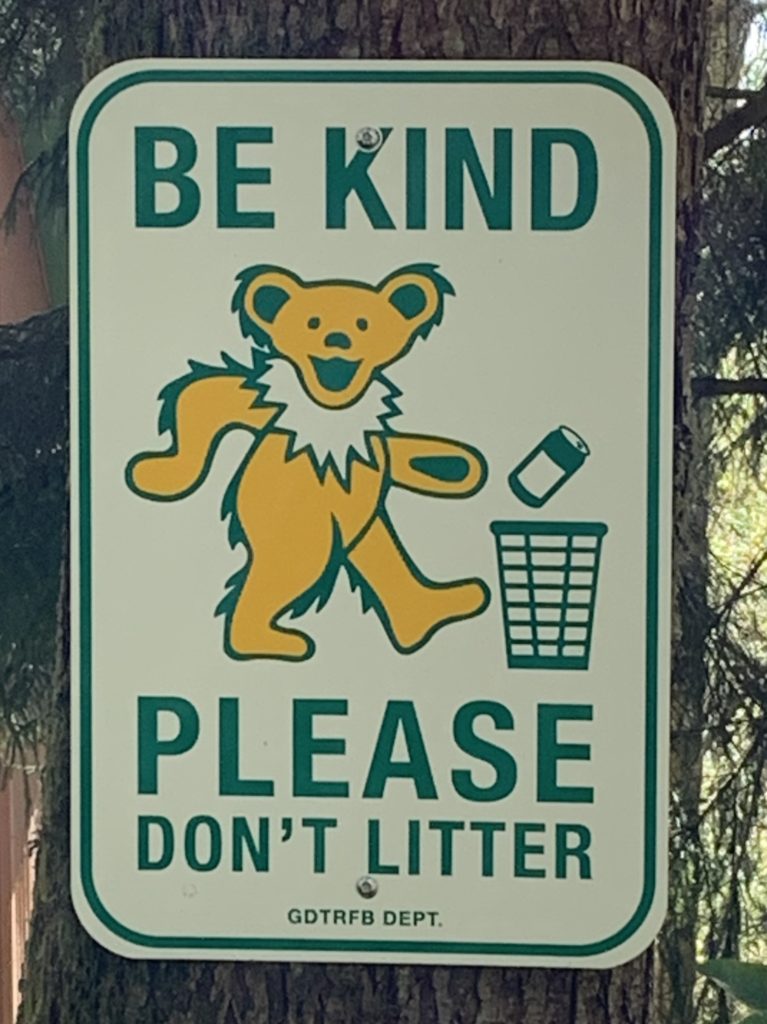
Better Than you Found it
A walk in the arboretum took me past a memorial bench for Robert Morgan Cameron-Husband, Father, Scoutmaster, Friend. On the plaque below his name was written, “Leave your campsite better than you found it.” I was touched by his words and disturbed because few people heed them.
My partner tells the story of how his father in the 1960s opened a pack of cigarettes while driving and was about to discard the plastic covering out the window as he usually did, when he turned to his son and said, “I better not do this, Lady Bird won’t like it.” Instead of littering, he put the trash in his pocket to throw in a receptacle later.
Lady Bird Johnson, when First Lady, pushed Americans and Congress to beautify the nation’s capital and cities. Deeply concerned about urban decay and pollution, she is quoted as having said, “A little beauty, something that is lovely, I think, can help create harmony which will lessen tension.”
Mrs. Johnson believed that pollution, recreation, mental health, the crime rate, rapid transit, highway beautification, the war on poverty, and the nation’s parks were interwoven- that affecting one part leads to a reaction that shows up elsewhere. With Lyndon Johnson’s support, the Highway Beautification Act was passed in 1965 to limit billboards, hide junkyards, and get rid of unsightly messes alongside America’s interstate system. It also funded local efforts to clean up and landscape green spaces. The Johnsons were green before green was popular.
Efforts to improve the country’s appearance didn’t start with the Johnsons, however. Keep America Beautiful, a Connecticut-based non-profit was founded in 1953. Today there are 600 state and community-based affiliate organizations and more than 1,000 partner organizations. Their goal is to end littering, improve recycling and beautify American communities. They initiated the Great American Cleanup that celebrated its twenty-third year this March. Locally, SOLVE was founded in 1969 to bring Oregonians together to improve the environment. Volunteers implement city and beach cleanups, plant trees and shrubs, and remove invasive species to help habitats stay healthy.
To date, city-wide efforts by dedicated individuals haven’t been able to keep pace with the destruction, trash, and graffiti claiming the streets. The pandemic added to the problem by increasing homelessness and creating unemployed people with time on their hands who do not take pride in their environment. With an inadequate number of trash recepticals around town, garbage is found everywhere. People who ordinarily wouldn’t litter do so and add to the pollution. I’ve watched cups and wrappers thrown from cars and busses, receptacles overturned for fun, bags filled with overflowing trash left near park benches and packaging dropped to stay where it lands. Discarded sofas and beds drenched with rainwater line streets. Unconcerned individuals have made too many towns unbelievably filthy. Portland, as an example, is no longer a city to wander through with pride. My town reminds me of visits I’ve taken to struggling developing countries.
Freedom does not give people the right to do and live any way they want to. They don’t have the right to live in filth and make other people sick in body and mind. Rat-infested garbage piling up near homeless encampments leads to hepatitis A, dysentery, and typhus. Thriving rodent populations spread and carry diseases to parks and private gardens.
Do we need another Lady Bird to inspire the nation to leave campsites better than they’re found, or are there ways to do something about the problem now? I was pleased to learn that Portland has started paying homeless and recently housed people $20 an hour to pick up trash. Focused on center-city now, they aim to spread outward until the entire city is clean. Workshops are being held to train volunteers in graffiti removal, another problem that mar’s my soul and reduces livability.
To replace tent strewn streets, villages with tiny homes equipped with heat, electricity, and locked doors are being built so that homeless people can live in dry, safe accommodations near toilets, showers, and trash bins. The answer is uncertain as to whether they will solve the problem of housing the homeless. Tiny homes may be trendy, but they aren’t built to survive years of harsh weather. They are a good, short-term solution that needs to be followed by permanent shelters, counseling, and jobs. Because so many people in our community do care, I am hopeful that we will get there.
Scouting organizations and churches traditionally promoted ethical and community-minded behaviors that families reenforced.
Unfortunately, numerous lawsuits, and difficulty finding volunteers plague scouting. Membership numbers have been steadily declining since a high in 1973, so fewer kids are learning to leave campsites better than they found them.
Church attendance is also on the decline. Fewer people listen to sermons about social responsibility and moral behavior that reinforce, “do unto others as you would have others do unto you,” and “two wrongs don’t make a right.” Racism is wrong, but so is vandalism.


Without strong leadership, what can we do about cleaning up the environment? For sure, don’t litter. But, the burden to reduce litter cannot be entirely placed on the consumer. It has to occur when items are manufactured and marketed. We don’t need elaborate, oversized packages made of material that can’t be recycled. I didn’t need to receive a book I ordered through Amazon in a box that was 10 times its size and filled with plastic bubbles. Too many products sold in markets and hardware stores are in packages that are larger than the item and difficult (near-impossible) to open. In the past, many of these products were not packaged at all.
We can reduce the use of plastics that cause wildlife to die in record numbers. The Great Pacific Garbage Patch spans the entire width of the area between Japan and the United States. It is 7.7 million square miles, mostly plastic floating in the North Pacific Ocean and circles around continually adding trash. Our engineers and scientists should be challenged to come up with solutions that are bio-degradable, and as consumers, we can avoid purchasing plastic items and using plastic bags.
Graffiti has become an underground artform among disenfranchised youth. Somehow, we need to find ways to change their mindset. Defacing public and private property make more people unhappy than happy. There are times that I think the country is too tolerant, for we allow destructive behavior to happen without consequences. Too many parents don’t take responsibility for wayward children. By holding families, as well as the perpetrators accountable, and requiring them to join work teams, and fund needed repairs due to their family member’s mischief, we are bound to reduce vandalism, graffiti, and littering.
Lastly, as adults, it behooves each of us to become role models for youth. We can all be Lady Bird and Lyndon Johnson advocates for a green and beautiful environment. To live well in the community, we must each leave our campsite better than we found it. This Earth Day is a perfect time to get started.

References:
Social Impact Movement website. 2021. What is the Great Pacific Garbage Patch? retrieved from https://socialimpactmovement.org/what-is-the-great-pacific-garbage-patch/?gclid=Cj0KCQjw6-SDBhCMARIsAGbI7UjjXNdbetE7yvgQTc2rGtgY2AbyJAlSupGc34Lo7tavWcC3UdZ7Sa0aAolDEALw_wcB.
PBS website. Lady Bird Johson: The First Lady’s Beautification Campaign. retrieved from https://www.pbs.org/ladybird/shattereddreams/shattereddreams_report.html
